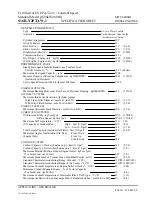
23-12
23-3
TEST FLIGHT
Ambient air and engine operating temperatures are of major concern during this test flight.
Do a normal pre-flight run-up in accordance with the Airplane Flight Manual. Conduct a
normal take-off with full power and monitor the fuel flow, RPM, oil pressure, cylinder head
temperatures and oil temperatures. Reduce to climb power in accordance with the Airplane
Flight Manual. The manual mixture control should be set in the full rich position for all
operations except leaning for field elevation and leaning to maintain smoothness during
climb and leaning for cruise economy. Leaning operations must be performed in
accordance with the Airplane Flight Manual.
NOTE. . . New, rebuilt and overhauled engines or engines that have had new or repaired
cylinders installed must be flown in accordance with the following procedure for the first two
hours of operation.
Level flight cruise should be at 75% power with best power or richer mixture for the first hour
of operation. The second hour power settings should alternate between 65% and 75%
power with the appropriate best power mixture settings. The best power mixture setting is
100° to 125° rich of peak turbine inlet temperature. Engine controls or aircraft attitude
should be adjusted as required to maintain engine temperatures and pressures within
specifications.
Descent from high altitude should be accomplished at low cruise power settings. During
descent engine pressures and temperatures must be carefully monitored. Avoid long
descents with cruise RPM and manifold pressure below 18" Hg.
CAUTION. . . Rapid descents at high RPM and low manifold pressure are to be avoided.
During descent monitor cylinder head and oil temperatures maintaining above the minimum
recommended operating range.
NOTE. . . Avoid long descents at low manifold pressure, which can result in excessive
engine cooling. Satisfactory engine acceleration may not occur when power is applied.
Any discrepancies detected during test flight must be corrected and the aircraft again test
flown prior to approval of engine for return to service. The appropriate logbook entries must
be made in accordance with Part 43 of the Federal Aviation Regulations (FAR) before the
engine can be returned to service.
Summary of Contents for TSIO-360-RB
Page 11: ...1 5 FIGURE 1 1 Engine Description L TSIO 360 RB ...
Page 12: ...1 6 FIGURE 1 2 ENGINE DESCRIPTION L TSIO 360 RB Cont d ...
Page 13: ...1 7 FIGURE 1 2 ENGINE DESCRIPTION L TSIO 360 RB Cont d ...
Page 14: ...1 8 FIGURE 1 2 ENGINE DESCRIPTION L TSIO 360 RB Cont d ...
Page 15: ...1 9 FIGURE 1 2 ENGINE DESCRIPTION L TSIO 360 RB Cont d ...
Page 25: ...3 1 CHAPTER 3 SEALANTS AND LUBRICANTS Sealants Lubricants 3 2 ...
Page 32: ...4 2 INTENTIONALLY LEFT BLANK ...
Page 54: ...6 2 INTENTIONALLY LEFT BLANK ...
Page 58: ...6 6 FIGURE 6 1 INSTALLATION DRAWING ...
Page 59: ...6 7 FIGURE 6 1 INSTALLATION DRAWING cont d ...
Page 60: ...6 8 FIGURE 6 1 INSTALLATION DRAWING cont d ...
Page 61: ...6 9 FIGURE 6 1 INSTALLATION DRAWING cont d ...
Page 64: ...6 12 INTENTIONALLY LEFT BLANK ...
Page 70: ...7 6 INTENTIONALLY LEFT BLANK ...
Page 82: ...10 2 INTENTIONALLY LEFT BLANK ...
Page 85: ...11 3 FIGURE 11 1 INDUCTION AND EXHAUST SYSTEM ...
Page 94: ...11 12 INTENTIONALLY LEFT BLANK ...
Page 110: ...12 16 INTENTIONALLY LEFT BLANK ...
Page 124: ...14 4 INTENTIONALLY LEFT BLANK ...
Page 128: ...15 4 INTENTIONALLY LEFT BLANK ...
Page 132: ...16 4 INTENTIONALLY LEFT BLANK ...
Page 139: ...17 7 FIGURE 17 4 STARTER ADAPTER FITS LIMITS ...
Page 140: ...17 8 INTENTIONALLY LEFT BLANK ...
Page 143: ...18 3 FIGURE 18 1 ACCESSORY CASE DESCRIPTION ...
Page 147: ...19 3 FIGURE 19 1 LUBRICATION SYSTEM SCHEMATIC ...
Page 149: ...19 5 ACCESSORY CASE INTERNAL VIEW TSIO 360 FIGURE 19 2 OIL PUMP DESCRIPTION TSIO 360 ...
Page 150: ...19 6 ACCESSORY CASE INTERNAL VIEW LTSIO 360 FIGURE 19 3 OIL PUMP DESCRIPTION LTSIO 360 ...
Page 158: ...19 14 INTENTIONALLY LEFT BLANK ...
Page 181: ...21 3 FIGURE 21 1 CRANKCASE DESCRIPTION ...
Page 186: ...21 8 INTENTIONALLY LEFT BLANK ...
Page 194: ...22 8 INTENTIONALLY LEFT BLANK ...
Page 203: ...23 9 FIGURE 23 6 CONSTANT SPEED SEA LEVEL PERFORMANCE CURVE ...
Page 204: ...23 10 FIGURE 23 7 FUEL FLOW VS METERED FUEL PRESSURE ...
Page 205: ...23 11 FIGURE 23 8 FUEL FLOW VS BRAKE HORSEPOWER ...

































